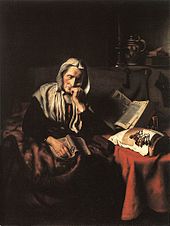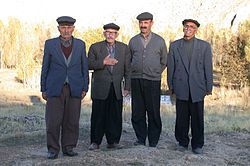- Old age
-
Old age (also referred to as one's eld) consists of ages nearing or surpassing the average life span of human beings, and thus the end of the human life cycle. Euphemisms and terms for old people include seniors (American usage), senior citizens (British and American usage) and the elderly.
Old people have limited regenerative abilities and are more prone to disease, syndromes, and sickness than other adults. For the biology of ageing, see senescence. The medical study of the aging process is gerontology, and the study of diseases that afflict the elderly is geriatrics.
Contents
Definition
The boundary between middle age and old age cannot be defined exactly because it does not have the same meaning in all societies. People can be considered old because of certain changes in their activities or social roles. Examples: people may be considered old when they become grandparents, or when they begin to do less or different work—retirement.
The 1800s was the start of old age pensions, beginning in Germany, where the fixed retirement age at that time was 70. The fixed retirement age of 70 was the first attempt at defining the start of old age. In the United States of America, and the United Kingdom, the age of 65 was traditionally considered the beginning of the senior years because, until recently, United States and British people became eligible to retire at this age with full Social Security benefits. In 2003, the age at which a US citizen became eligible for full Social Security benefits began to increase gradually, and will continue to do so until it reaches 67 in 2027. As of 2011, the age is 66.[1]The original raison d'etre behind old age pensions was to prevent poverty and elderly persons from being reduced to beggary, which is still common in some underdeveloped countries, but growing life expectancies and elder populations has brought into question the model under which pension systems were originally designed for.
Physical changes
There is often a general physical decline, and people become less active. Old age can cause, amongst other things:
- Wrinkles and liver spots on the skin
- Change of hair colour to gray or white
- Hair loss
- Reduced lung capacity
- Changes in the vocal chords that produce the typical "old person" voice
- Lessened hearing
- Diminished eyesight
- Slower reaction times and agility
- Reduced ability to think clearly
- Difficulty recalling memories
- Depressed mood
- Lessening or cessation of sex, sometimes because of physical symptoms such as erectile dysfunction in men, but often simply a decline in libido
- Greater susceptibility to bone diseases such as osteoarthritis.
Demographic changes
In the industrialized countries, life expectancy has increased consistently over the last decades.[2] In the United States the proportion of people aged 65 or older increased from 4% in 1900 to about 12% in 2000.[3] In 1900, only about 3 million of the nation's citizens had reached 65. By 2000, the number of senior citizens had increased to about 35 million.[citation needed] Population experts estimate[citation needed] that more than 50 million Americans—about 17 percent of the population—will be 65 or older in 2020. The number of old people is growing around the world chiefly because of the post–World War II baby boom, and increases in the provision and standards of health care.
The growing amount of people living to their 80s and 90s in the developed world has strained public welfare systems and also resulted in increased incidence of diseases like cancer and dementia that were rarely seen in premodern times.
Psychosocial aspects
According to Erik Erikson’s "Eight Stages of Life" theory, the human personality is developed in a series of eight stages that take place from the time of birth and continue on throughout an individual’s complete life. He characterises old age as a period of "Integrity vs. Despair", during which a person focuses on reflecting back on their life. Those who are unsuccessful during this phase will feel that their life has been wasted and will experience many regrets. The individual will be left with feelings of bitterness and despair. Those who feel proud of their accomplishments will feel a sense of integrity. Successfully completing this phase means looking back with few regrets and a general feeling of satisfaction. These individuals will attain wisdom, even when confronting death.[4][5][6]
Life expectancy
In most parts of the world, women live, on average, longer than men; even so, the disparities vary between 9 years or more in countries such as Sweden and the United States to no difference or higher life expectancy for men in countries such as Zimbabwe and Uganda.[7]
The number of elderly persons worldwide began to surge in the second half of the 20th century. Up to that time (and still true in underdeveloped countries), five or less percent of the population was over 65. Few lived longer than their 70s and people who attained advanced age (ie. their 80s) were rare enough to be a novelty and were revered as wise sages. Accidents and disease claimed many people before they could attain old age, and because health problems in those over 65 meant a quick death in most cases. If a person lived to an advanced age, it was due to genetic factors and/or a relatively easy lifestyle, since diseases of old age could not be treated before the 20th century.
Individuals who became famous in their old age
 Harry Patch, known as "the Last Tommy", was a British supercentenarian, and the last surviving soldier to have fought in the trenches of the First World War.
Harry Patch, known as "the Last Tommy", was a British supercentenarian, and the last surviving soldier to have fought in the trenches of the First World War.
- Ethel Percy Andrus, retired school principal who founded AARP at 74 in 1958
- Harry Bernstein, author who published his first book, The Invisible Wall, at 96 in 2007
- Jeanne Calment, longest confirmed lifespan and the oldest person of France
- Ann Nixon Cooper, who at age 106 made national news during the 2008 US presidential election for voting for Barack Obama. She was mentioned in Obama's victory speech.
- Luigi Cornaro and his classic The Art of Living Long[8] or Discourses on the Sober Life.[9]
- Granny D, political activist who ran for public office at the age of 94
- James Fisher, blacksmith who returned from retirement to become the first person over the age of 100 to achieve the ACA qualification.
- Enrico Dandolo, who led the infamous Fourth Crusade in his 80s
- Sadie and Bessie Delany, civil rights activists
- Ruth Ellis, 101-year-old African-American LGBT activist
- Florence Holway, rape survivor and activist
- Mary Harris "Mother" Jones, Irish-American labor organizer
- Alice Herz-Sommer, the world's oldest Holocaust survivor at age 106
- Maggie Kuhn, activist and founder of the Gray Panthers
- Mae Laborde, actress who began acting in her 90s
- Bernando LaPallo, American doctor who wrote his first book at age 107 and is the world's oldest blogger at age 109
- Buster Martin, said to be the oldest worker in the UK at age 103
- Grandma Moses, American folk artist
- Narses, who became a successful general at 74
- Peter Oakley, aka geriatric1927, British senior famous for his YouTube videos
- Nola Ochs, became the oldest college graduate ever at age 98
- Clara Peller, Wendy's spokeswoman, famous for her "Where's the Beef?" catch-phrase
- Emily Perry, actress who played the role of Madge Allsop
- Mary Jane Rathbun, nurse and activist who was arrested for serving marijuana brownies to AIDS patients
- Malvina Reynolds, folk singer and political activist
- Olive Riley, blogger who started blogging at 107
- Eunice Sanborn, world's oldest living person from November 4, 2010 until January 31, 2011
- Arthur Winston, who at age 100 retired from his job working for the Los Angeles Metro after 72 years missing only one day, that being for his wife's funeral in 1988.
See also
- Aging in dogs
- Aging in place
- Centenarian
- Elderly care
- Geriatric care management
- List of the verified oldest men
- List of the verified oldest women
- Oldest people
- Pensioner
- Respect for the Aged Day
- Silver Alert
- Supercentenarian
References
- ^ "Table 26: Life expectancy at birth, at 65 years of age, and at 75 years of age by race and sex: United States, selected years, 1900 - 2005". Centers for Disease Control and Prevention. http://www.cdc.gov/nchs/data/hus/hus08.pdf#026. Retrieved 26 August 2010.
- ^ Meyer, Julie (2001). "Census 2000 Brief, C2KBR/01-12, U.S.". "Washington, DC": "Census Bureau". http://www.census.gov/prod/2001pubs/c2kbr01-12.pdf. Retrieved 2009-03-17.
- ^ Erikson, E.H. (1968). Identity: Youth and Crisis. New York: Norton.
- ^ Erikson, E.H. (1963). Childhood and Society. (2nd ed.). New York: Norton.
- ^ Carver, C.S. & Scheir, M.F. (2000). Perspectives on Personality. Needham Heights, MA: Allyn & Bacon
- ^ de Blij, Harm. The power of place. Geography, Destiny, and Globalization's Rough Landscape. Oxford University Press. London:2009. p161ff
- ^ The art of living long (1917, [c1903)] from Internet Archive
- ^ How to Live 100 Years, or Discourses on the Sober Life Soil And Health Library
External links
- Laura Carstensen - research at Stanford university's Life-span Development Laboratory, and Stanford Center on Longevity.
- International Federation on Aging—informs and promotes positive change for old people globally
- Age UK—UK charity supporting those in old age in the UK and in developing countries
- HelpAge International—UK-based international charity supporting older people in developing countries. Sister organisation of Age UK (above)
- People 'get happier as they age'
Preceded by
Middle ageStages of human development
Old ageSucceeded by
DeathHuman Development: Biological • Psychological Pre- and perinatal BiologicalPsychologicalInfancy BiologicalPsychologicalInfant and child psychologyChildhood BiologicalPsychologicalAdolescence BiologicalPsychologicalYoung adulthood PsychologicalMiddle adulthood BiologicalMaturity BiologicalPsychologicalOld ageLegal and general definitions Theorists and theories Categories:
Wikimedia Foundation. 2010.






